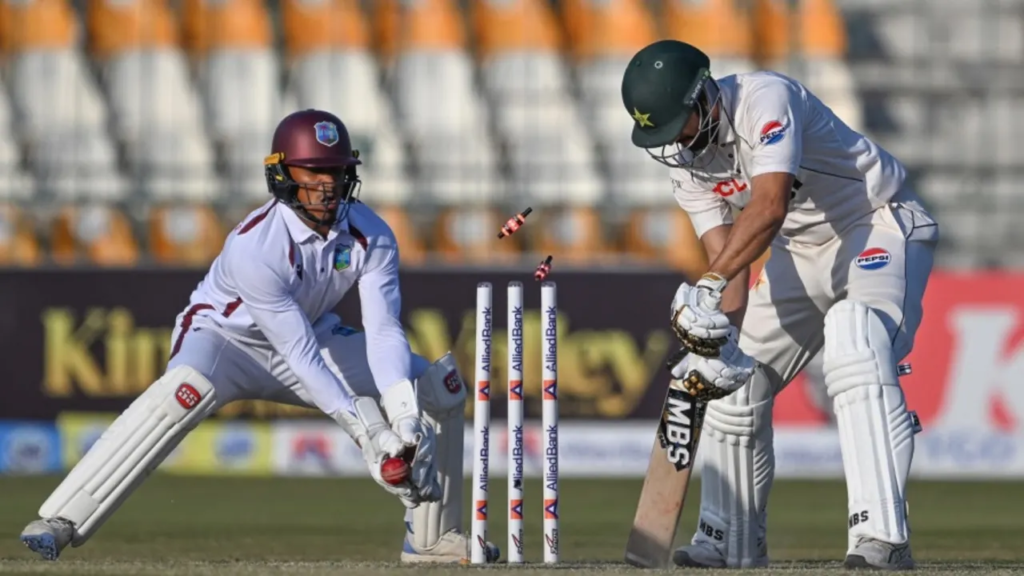
Is preparing rank-turners the new way forward for Pakistan in test cricket after three wins in 4 test matches?
Is preparing rank-turners now the new normal for improving Pakistan in test cricket?
Many fantastic myths about Pakistani fast bowling have been created. About Sarfraz Nawaz, the crafty creator of a brand-new art that nobody knows anything about. The cricketer who captained Pakistan’s finest team ever was Imran Khan, who sprinted with an open chest, grace, and effectiveness in equal measure, ending in a gazelle-like gallop.
Of Shoaib Akhtar, a high-speed train in a world of freight locomotives, of Waqar Younis and Wasim Akram, whose swing and accuracy were as devastating as they were captivating to watch.
The tales we tell about Noman Ali and Sajid Khan will be very different and not nearly as timeless. The current setup, which was partly led by Aqib Javed, a member of Pakistan’s selection panel and all-format interim coach, dispensed with idealism and infused realpolitik into their philosophy after years of repeated failures to create a home template in line with the self-image Pakistan wishes to live up to.
Their new concept was both simple and clever, and it was right in front of them. In domestic cricket, Pakistan’s elderly fingerspinners always seemed to perform well in conditions that encouraged spin. Therefore, they prepared surfaces that were ragged from day one, rendering quick bowlers worthless, using fans, heaters, windbreakers, and greenhouses.
Get the ball ragging, bat first, rinse, and repeat. And fans were content to forgo playing style in favour of effectiveness, even in the face of resentment from some places. One could overlook the negative effects on batters’ confidence and technique, or the implications for Pakistan’s fast bowling future. Shan Masood, their captain, even went so far as to refer to the fast bowlers’ and hitters’ actions as a “sacrifice”. But they needed to prevail.
On the other hand, you must at least make sure the trains actually run on schedule if it is your sole selling point. Pakistan has been shown the fragility of that premise over the last two days by the West Indies.
Since Pakistan needed to win “all their Test matches” at home in order to get to the final, Aqib was already making references to the upcoming World Test Championship cycle and how they would duplicate these wickets before to this Test.
Although no pitch can ensure you wouldn’t have to bat fourth, Pakistan was on the right side of it in two of the first three Test matches, which they won in this manner.
To their credit, however, Pakistan has consistently made clear their objectives for the future. Pakistan has been encouraged to dream of a potential spot at the 2027 WTC final by an on-paper soft draw for the upcoming cycle, where home victories are always the first step. Masood supported his coach by offering domestic cricket on comparable fields, which would improve batsmen’ ability to handle opposition spin.
However, Pakistan must be careful not to get ahead of themselves since they can end up getting ready for the season that just ended rather than the one that comes next.
Pakistan will play two Test matches in 2026 against Sri Lanka, a team they are unlikely to want to curate uber-spin tracks for anyhow, after hosting South Africa later this year. It seems unlikely that a year spent perfecting the spin methods of hitters on pitches devoid of red-ball quicks will help them much when they travel abroad from March to August of the following year, five of which will be in England and the West Indies.
The most casual critique of Aqibball, as it has been known, is that it was only a temporary solution. However, Jomel Warrican’s West Indies taught them that it might not even be a fix, and Aqib and Masood have stated that they do not see it as a short-term solution.

